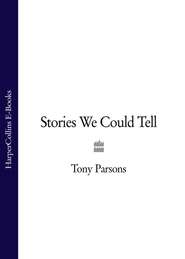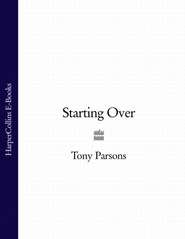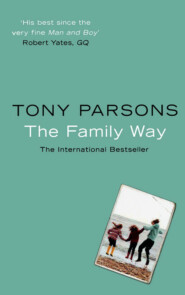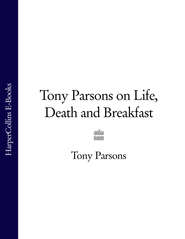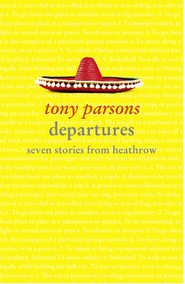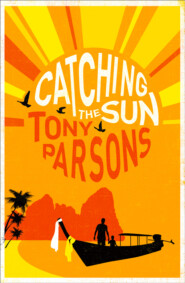По всем вопросам обращайтесь на: info@litportal.ru
(©) 2003-2024.
✖
Man and Wife
Автор
Год написания книги
2019
Настройки чтения
Размер шрифта
Высота строк
Поля
‘Come on, handsome, dance with your two girls.’
Sometimes my world felt like one of those warnings on a box – the bit about small parts causing choking.
But when Cyd and Peggy and I danced to Kylie Minogue in the remains of the party, burst balloons and coloured streamers underfoot, bits of birthday cake trodden into the parquet floor, then we laughed out loud, laughed with pure, undiluted joy, laughed so much that we could hardly sing along to ‘Can’t Get You Out of My Head’.
And for once my life seemed as well-rounded and fulfilled as the one lived by Lucy Doll herself.
four (#ulink_cb6d72b3-977e-53a1-a7b1-c875ae4cb2fb)
My mother still slept with the lights on.
In the house where she had spent most of her married life, where she was a young wife and mother, the house that had been her home for so long, she attempted to sleep at night with all the bedroom lights blazing.
‘I can’t seem to nod off, Harry. I lie there with my Hello! and Radio 2 on low – next door have got a new baby, did I tell you? She’s a little smasher – and as soon as I drop off, I wake up again. Funny, isn’t it? Isn’t it strange?’
‘It’s not strange at all, Mum. The reason you can’t sleep is because you’ve got a hundred-watt bulb burning right above your head. It’s a sleep deprivation technique. A form of torture.’
‘Oh, I don’t know about that, love.’
‘Of course you can’t sleep. You can’t sleep because you don’t turn your light off. Can’t you try sleeping with the light off? Can’t you try it just once, Mum? Please?’
‘Oh, I couldn’t do that,’ she said, smoothing my son’s golden bell of hair as he sat on the floor between us, consulting the TV listings in the Radio Times. ‘I couldn’t lie there all night in the dark. Not without your dad.’
My father had been dead for two years.
It was already two years since my father lay in that hospital bed, his brain fogged by pain and the killers of pain, the sickness overwhelming him. And I thought that the old man’s lung cancer would surely kill both of them. I didn’t think that my mother could live without my father. But they were tougher than they looked, women like my mum, those forever wives, the dutiful homemakers whose one act of rebellion was wearing miniskirts for a brief period as the sixties became the seventies. Women like my mum were built to survive anything. Even their hard man husbands. She couldn’t sleep without leaving the lights on, it was true. But she could live without him. She had proved that by now.
My parents had seemed like one living organism for so long – Paddy and Elizabeth, who made the long journey from teenage sweethearts to doting grandparents, the grand tour that so few married couples still get to make – and I could never imagine one of them without the other.
I knew that my father couldn’t live without my mother. Her going first would have killed him, it would have robbed him of his main reason for living. And I always assumed that she could not survive without him.
I was wrong.
My mother was from the last generation of women who expected to be taken care of by the men they married. She saw nothing strange in letting my dad do the driving, make the money, sit in the big chair, coming back from work and scoffing his dinner – his ‘tea’ – like a tribal chieftain home from the wars.
But in old age, in widowhood, it turned out that my mum’s generation of women had an independent streak that they were never given credit for. All those housewives from the fifties and sixties, all those brides of austerity, the last generation of women who made clothes for their children – inside their sensible pastel-coloured cardigans, they were made of steel.
My mum didn’t die. My dad’s death didn’t kill her. She refused to let his death be her death too.
She saw her friends for coffee and cake, exchanged gossip with a floating social forum known simply as ‘the girls on the bus’, she knitted chunky jumpers for the neighbour’s baby, the little smasher next door – my mum thought that all babies were little smashers – she played Dolly Parton at full volume on her Sony mini stereo system.
‘Lovely voice,’ she said of Dolly Parton. ‘Lovely figure.’
She called her pack of brothers every day – it was almost impossible to reach her on the phone, she was always engaged – she fretted about their jobs, their children, their health.
My mum was living without my father, the man she built her world around. She was living her life without him. That seemed incredible to me. And, I suspected, to her too.
My dad’s death had left her maddened with grief. She cried in supermarkets, on the bus, at all the wrong times. She couldn’t help herself. She cried until the tears were all gone. But she coped. More than that, she learned to engage with life, to fend for herself, to laugh again.
‘I’m not dead yet,’ she was fond of pointing out.
Apart from the lights burning all night long – what did she think would happen to her in the darkness? – my mum carried on. Not as normal, because normal was gone now, but in a world that had changed, a world without her beloved Paddy. And she did it because my mother was a woman who didn’t just love my father. She loved people. All kinds of people.
The young neighbours and their new baby. The old woman on the other side, my Auntie Ethel, who wasn’t really my auntie at all, who was a young wife and mother with my mum, more than half a lifetime ago.
She loved those old friends who met her in the new Starbucks in the high street of the suburban town where she had made a life. And her family. All her brothers, their numbers only now starting to dwindle. The women they married. Their grown-up children, now with children of their own. And then there was me, her only child.
But above and beyond all the rest of us, my mum loved her grandson. Her Pat. My son was the best reason she had for carrying on with my old man gone.
‘He’s the love of my life, aren’t you, gorgeous? He’s my little darling.’
My son smiled patiently, reaching for the remote.
There was a kind of genius about my mother, and it was a genius for making you feel loved. Not just because her conversation was peppered with terms of endearment, all these sweethearts, loves, darlings, beautifuls and angels that seemed second nature to her and to women of her background and generation. She had a way of making you feel as though you were more important than anything else in her world, even if she was only making you a cup of tea, or smoothing your hair, or knitting you something that you would only wear when you saw her.
She was not exactly a merry widow – she spent too many days at the graveyard, and I feared that she would sleep with the lights on forever – but my mum had learned to go on living. My father’s clothes were still in the wardrobe, still not ready for the charity shops, but his spirit did not haunt this house.
My mum had finally filled it with her own spirit.
The smell of Old Holborn and Old Spice was gone. There was no longer brown ale sitting on top of the fridge and a bottle of Irish whiskey standing on top of a little chest of drawers that was known as the drinks cabinet. And the music had changed. That was what I noticed most of all. That was how I really knew that my father’s ghost had flown.
I walked into the house where I was a boy and I no longer heard Sinatra and Dean Martin and Nat King Cole. There were none of the old songs playing – Sammy Davis Junior moaning ‘What Kind of Fool Am I?’, Frank during the Capitol years, Tony Bennett’s 16 Most Requested Songs, soundtrack albums that spanned the years between Oklahoma! and West Side Story.
My mum gave all of my dad’s music to me. She had her own records to play.
My mother loved country and western. Songs with stories and tunes, songs that let you know exactly where they stood. Happy songs. Sad songs. Songs for dancing, drinking, mourning the man you had lost. She was wild for all that twangy, tear-stained stuff, although I had no idea if she had always loved it or if Dolly Parton, Tammy Wynette and Patsy Cline were new tastes. It was my old man who was the DJ in this house. MC Paddy Silver and his swinging vinyl. Not any more.
My mother had been dealt two terrible blows in recent years. She lost my father, the man she had loved ever since he came back to her East End home with one of her brothers after they had sparred together at the local boxing club. She lost the man she spent a lifetime loving, that roaring boy, that strong man who learned to be gentle. Lost him to lung cancer, lost him to time.
And although I could hardly stand to admit it to myself, let alone to her, in some crucial way she had also lost her grandson.
It was just not so easy now I was divorced. Now that Pat was living with his mother, and I was not living with either of them, it was not so easy for my son to spend endless hours with his grandmother.
With all my heart, I wished it were different. I wished it was as simple as the old days, when I was still with Gina and my mum saw Pat all the time, or even later, when Gina was trying her luck in Japan, attempting to get her life back, and I was looking after Pat alone, that time when my mum was like a mother to both of us. I wished it was as straightforward as it used to be, because I knew that Pat was the centre of my mum’s universe. But it would never be like that again. The centre of the universe had shifted.
That’s who gets forgotten in a divorce. The grandparents. These old people who worship the little boys and girls who are produced by their own grown-up, messed-up children, the fallible somehow begetting the perfect. Divorce makes grandparents feel as though all that unconditional love they have to give is suddenly surplus to requirements.
So I made an effort. I did everything to pretend that the centre of the universe was where it had always been. Half of my time with Pat was time spent with my mum. We jumped in my car and drove out to Essex, on roads that I had known all my life.
I remembered those roads when I was a child coming back from my nan’s house in the East End, asleep on the back seat of my old man’s Morris Minor. And I knew those roads as a teenager, zipping around in my Escort trying to impress the big-haired girl by my side. And later still, on those roads as a young husband and father, driving my little family out to see my proud parents. And much later, driving on those roads in my little two-seater sports car, Pat by my side, struggling against sleep, missing his mother, not wanting to talk about it.
I knew those roads. I remembered driving on them to see my dad getting sicker, my dad dying, the day of his funeral. All those car rides from London to Essex, from the edge of the city to the edge of the sea, measuring out my life, never imagining what would be coming next, never dreaming.
Now once more it was Pat and me driving out on those Essex roads to see my mum in the house where she slept with the lights on.
Gina gone. My old man gone. Cyd and Peggy not really a part of these rides out to Essex, to this old established part of our lives. My new wife and her child had their lives in London, and we left them there without even having to discuss it.
Growing up, growing old. You expect all of that. But my little family was growing smaller and more fragile. And you are never ready for that.






